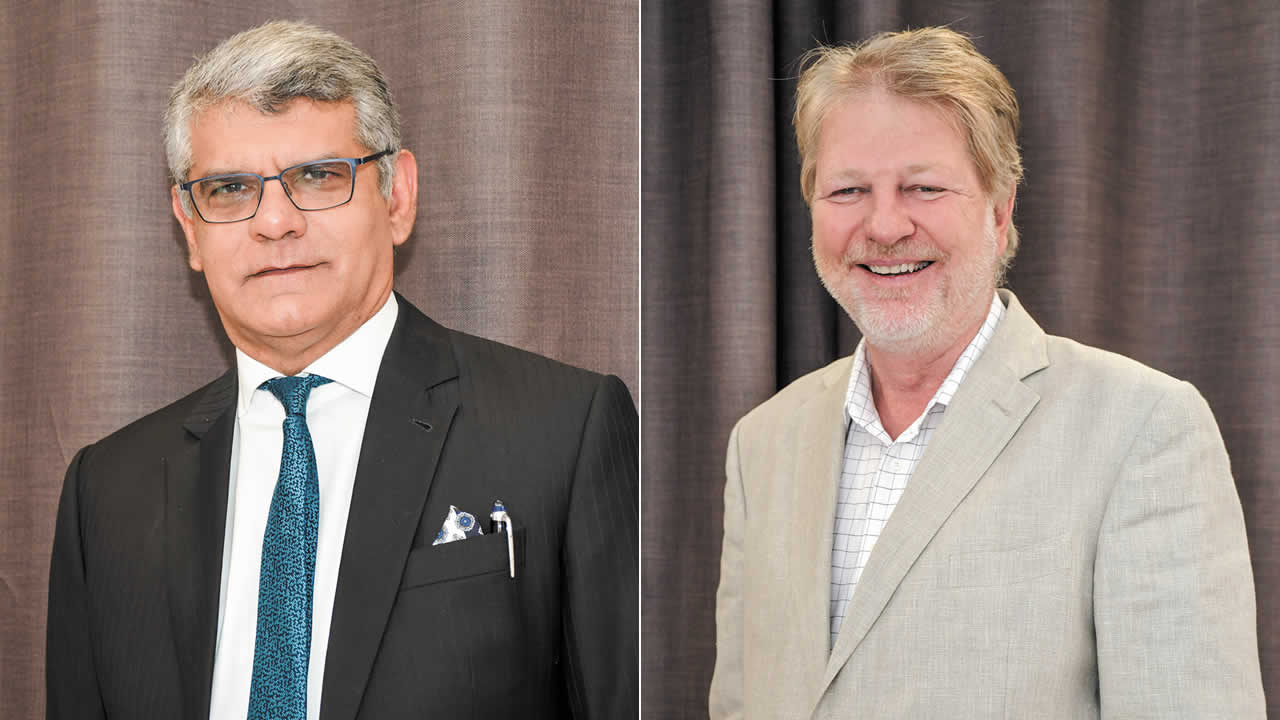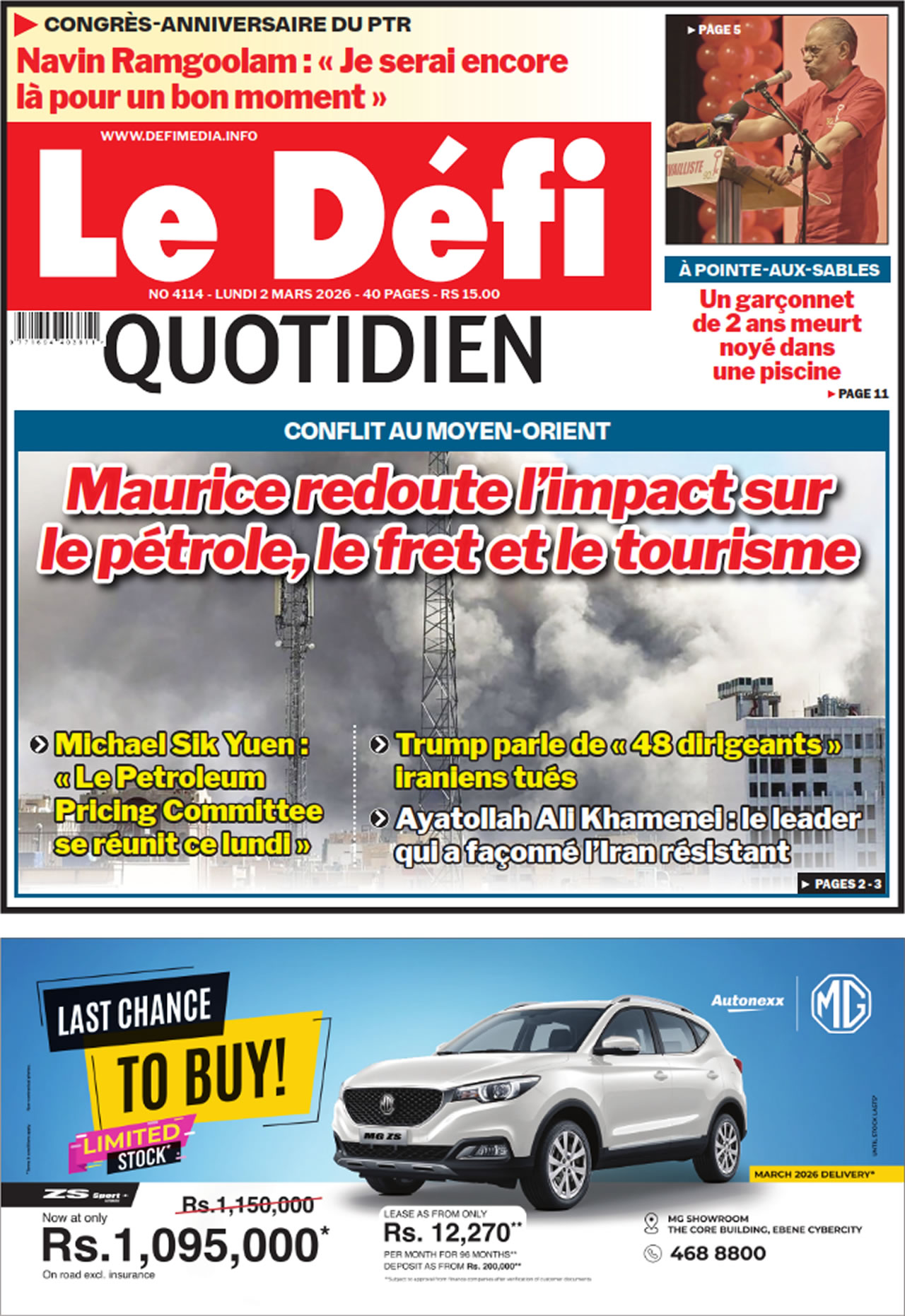
This week, News on Sunday spoke to Afsar Ebrahim and Pierre d’Unienville the co-founders of Kick Advisory Services. In the following joint-interview, they talk about the boutique corporate finance firm’s focus, the deals pipeline in the domestic Mergers & Acquisitions market. Afsar Ebrahim lays emphasis on the necessity to lookout for niche markets in the UAE. Pierre d’Unienville shares views about the Stock Exchange of Mauritius.
For starters, what’s Kick Advisory Services?
Afsar Ebrahim: Kick Advisory Services is a boutique corporate finance firm, licensed by Financial Services Commission. Both myself and Pierre d’Unienville are co-founders and we are both licensed by FSC. We set up on July 1,2020 and we are sailing to our fifth year of operation.
How does the firm differ from existing entities in the Mauritian jurisdiction?
Afsar Ebrahim: Our competitive advantage is our dedicated team, our commitment to our clients and our network. We are passionate about deal making. We bring innovative solutions and we do not leave any stone unturned to create value for our clients.
Pierre d’Unienville: We are totally focused on corporate finance, to the exclusion of any other service (e.g. audit) which ensures that we are totally independent at all times and always act in the best interest of our client. I would also add that Afsar and I jointly bring together a wealth of about 40 years’ experience in the Mergers & Acquisitions industry.
Pierre d’Unienville: “We have worked hard over the five years since Kick’s inception to carve a meaningful market share – and yes, without being immodest we can say we have had our fair share of successes”
What are the core services provided to clients?
Afsar Ebrahim: Our Key Focuses are M&A and fundraising, both equity and debt, exclusively through private placements. We also provide certain ancillary services, such company valuations, and advise a handful of clients on their restructuring. Our target market is in the main Mauritius, and we have tapped not only into some leading groups but also some SME and International Companies. We have been doing work in East Africa. In January we partnered with Finkons Advisory in Mumbai with a clear strategy of targeting Indian Corporates looking to venture into African markets. We have a handful of mandates running on this corridor but pleasantly surprised that we have also been solicited from African based businesses looking to invest into India.
Now, end of April, Kick Advisory unveiled another collaboration/partnership, the new one with Risk Insights. What’s the rationale behind such an accord? How does it help to further the ESG agenda in Mauritius?
Afsar Ebrahim: At the end of April, Kick Advisory announced a strategic relationship with Risk Insights (RI), formalized through a Memorandum of Understanding. The rationale behind this collaboration lies in a shared commitment to advancing the Environmental, Social, and Governance (ESG) agenda in Mauritius. Risk Insights is the largest ESG data provider for Africa globally and has an established partnership with the Stock Exchange of Mauritius (SEM) since last year. With climate change posing clear financial risks and opportunities for companies, banks, and asset owners, the need for credible, data-driven ESG insights has become increasingly urgent. While many African companies acknowledge this, a gap remains in resources and technical capacity to translate awareness into action. RI is responding by establishing an ESG Advisory Panel to support issuers and corporates in Mauritius.
Since the word ESG is out, do Mauritian companies have a proper grasp of ESG basics? How can it be improved?
Afsar Ebrahim: Kick Advisory, with its deep expertise in financial materiality, will play a critical role in this initiative. By leveraging RI’s ESG GPS data and analytics through RI, Kick Advisory will help companies identify and address disclosure gaps, strengthen stewardship, and align with international sustainability standards. This collaboration aims to reduce the risk of greenwashing, enhance corporate competitiveness, and ultimately improve access to green and sustainable finance across the Mauritian market.
Afsar Ebrahim: “Our target market is in the main Mauritius, and we have tapped not only into some leading groups but also some SME and international companies”
Any firm - be it a boutique firm or a global player - strives to be part of the next biggest M&A. And Kick Advisory has had its fair share over the past years. So, would be appropriate to conclude that Mauritius is rich in forthcoming M&A deals?
Pierre d’Unienville: We have worked hard over the five years since Kick’s inception to carve a meaningful market share – and yes, without being immodest we can say we have had our fair share of successes. The local M&A market is of course restricted in size, but it is thriving and we are seeing an interesting pipeline of future deals coming through. As you well know and as is the norm in our industry, there are a number of those you will never hear about because the proposed transactions will not come through. hopefully, a few will hit the headlines, and we hope we will have assisted our clients creating (or in some cases, extracting) value.
In which industry do you expect more of such deals and/or consolidation?
Pierre d’Unienville: As I was saying, the market here is narrow and you have to be sector agnostic – we sometimes deal with firms from Europe that specialize in a particular industry, and this would be impossible here. So, the team keeps informed on a wide array of economic issues, so as to be in a position to advise on an eventual transaction in any industry. I guess you can expect further consolidation in the financial services industry, at large, in the coming months.
On the other hand, is restructuring a distressed company a tedious task?
Pierre d’Unienville: I believe restructuring and M&A are separate but complementary activities – if a company is in need of a restructuring, i.e. is in financial distress, we would consider a toolbox of which M&A is but one option. The most urgent action for a business in restructuring is usually to sort out a shortage of cash – so we may advise to dispose of a non-core subsidiary or business unit, with that objective in mind. But you could also consider alternative options, such as raising capital or maybe selling and leasing back immovable property. Time is usually of the essence for a business in distress, so the advisor must come up with options fast, and ideally execute swiftly.
What are the key steps for a successful restructuring?
Pierre d’Unienville: There are really 3 things to do: raise cash, raise cash, raise cash.
Afsar Ebrahim: Also, there must be a Burden Sharing Approach among the shareholders (equity injection or dilution), banks (restructuring of debt and waiver of capital and interest if warranted) and management (cost Reduction). All resulting in extra cash.
Afsar Ebrahim: “With climate change posing clear financial risks and opportunities for companies, banks, and asset owners, the need for credible, data-driven ESG insights has become increasingly urgent”
Do you expect, anticipate foreign groups to be on the prowl for such deals in Mauritius?
Pierre d’Unienville: Savvy foreign investors are always on the lookout for attractive acquisition targets and yes, we try and position Kick on either side of these possible transactions, i.e. we either advise the Mauritian sellers or the foreign buyers. We see a keen interest from Africa-focused private equity funds for the Mauritius jurisdiction, though these funds typically tend to focus on the higher end of deal sizes. Let’s be honest: deals large enough for PE funds to take a look can be few and far apart!! Interestingly, we also see acquisitive activity by businesses funded by private equity, which have deep pockets and look out for acquisitive growth. You have seen a number of these deals in offshore sector, for example.
The new partnership agreement between UAE and Mauritius is effective since 1st of April. How positive can the accord be in the short to medium term?
Afsar Ebrahim: UAE is a direct competitor to Mauritius in the Financial Services. The main competitive advantage of the UAE is Logistics, Emirates and Jebel Ali which makes it the trading capital of Africa. It also attracts High Net Worth Individuals from India and Africa with its flexible tax systems and ease of doing business. We have to explore how we can leverage on this agreement so that we can find mutual benefits. Mauritius must first define its market positioning so that African and Indian investors use a sandwich structure with both Mauritius and Dubai being involved. We must also explore market niche where we can export, for example, Victoria Pineapple. With two daily flights to Dubai, export of Agro produce should be a top priority.
Pierre d’Unienville: “The main limitation of the SEM is and will remain for some time the lack of proper liquidity”
Can Mauritius be an ideal stock exchange platform as the next step of a successful M&A and merger?
Pierre d’Unienville: The main limitation of the SEM is and will remain for some time the lack of proper liquidity. It is difficult – though not impossible – for an investor to consider an exit of a sizable investment through a listing on the SEM, at this point in time. I would act that key pieces of legislation (certain clauses of the Securities Act, notably) should be urgently reviewed.
Afsar Ebrahim: We have currently three platforms, SEM, MINDEX, AFRINEX. We have the opportunity to make use of all three. No IFC can gain recognition without a capital market which is efficient. We need depth and we need more institutions that play the market. Mauritian retail investors are too small in number and capacity to invest.
This combination of innovation and regulation creates a unique value proposition for businesses and investors seeking modern, efficient financial solutions. To fully realize this vision, Mauritius should focus on strengthening synergies between International Traditional exchanges
The introduction of the Virtual Assets and Digital Assets Platform (MINDEX) has been a game-changer in enhancing Mauritius’ financial ecosystem. By enabling tokenized M&A transactions and asset listings, MINDEX has the ability to make equity and assets more liquid and accessible to a broader range of investors. The platform’s support for security token offerings (STOs) and digital securities could also attract global investors looking for exposure to high-growth African and Asian markets.
Furthermore, Mauritius can differentiate itself from traditional financial hubs by leveraging digital asset innovation.
What is Kick Advisory’s assessment of the financial services sector?
Afsar Ebrahim: The Financial Services Sector can potentially reach 20% GDP. It is the only sector which currently can grow fast and create jobs for our educated talent pool. We need to broaden our service offerings and also encourage professionals with skills to settle here, as long as they are skillful in areas like Private Banking, Wealth Management, Fintech. We need a clear strategy for Africa, we need to enhance our ease of doing business and we need certainty of application of our tax regime.
 J'aime
J'aime














